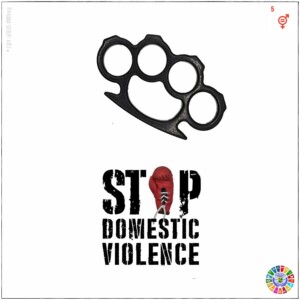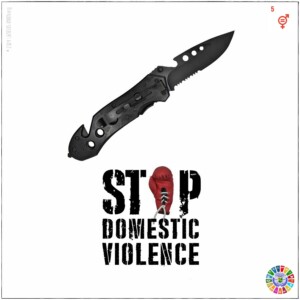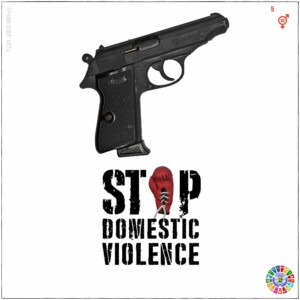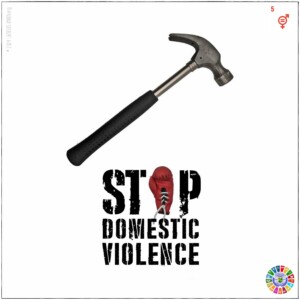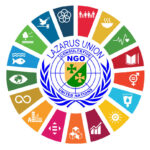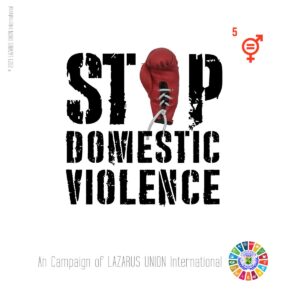Campaign Domestic Violence
Empowering Communities, Ending Violence: Addressing the Global Crisis of Domestic Violence
In a world striving for equality and justice, the persistence of domestic violence remains a sobering reality. Particularly alarming is the prevalence of violence against women within the confines of their own homes. This insidious form of abuse not only inflicts immediate harm but also perpetuates cycles of trauma and inequality across generations. For the Lazarus Union as an NGO with general consultative status at the United Nations, we are committed to addressing this pressing issue head-on, advocating for change, and empowering communities to create safer, more equitable societies.
Understanding the Global Crisis:
Domestic violence knows no boundaries—it transcends geography, culture, and socio-economic status. It manifests in various forms, including physical, sexual, emotional, and economic abuse. While both men and women can be victims, statistics overwhelmingly indicate that women and girls bear the brunt of this violence. According to the World Health Organization, an estimated one in three women worldwide has experienced physical or sexual violence, predominantly from an intimate partner. These staggering figures underscore the urgent need for collective action to combat the global crisis of domestic violence.
Impact on Sustainable Development Goals (SDGs):
The repercussions of domestic violence extend far beyond individual victims, permeating every aspect of society and impeding progress towards the Sustainable Development Goals (SDGs).
Several SDGs are directly affected by the prevalence of domestic violence:
- SDG 5: Gender Equality – Domestic violence is a blatant violation of women’s rights, undermining efforts to achieve gender equality and empower all women and girls. By perpetuating gender-based discrimination and inequality, it hampers women’s ability to participate fully in economic, social, and political spheres.
- SDG 3: Good Health and Well-being – Victims of domestic violence often suffer physical and mental health consequences, ranging from injuries and chronic pain to anxiety, depression, and post-traumatic stress disorder. Addressing domestic violence is crucial for promoting the health and well-being of individuals and communities.
- SDG 16: Peace, Justice, and Strong Institutions – Domestic violence thrives in environments where impunity reigns and justice systems fail to adequately protect survivors. Strengthening legal frameworks, enhancing access to justice, and promoting accountability are essential for building peaceful and inclusive societies.
- SDG 10: Reduced Inequalities – Domestic violence exacerbates existing inequalities, particularly those related to gender, income, and social status. By perpetuating cycles of poverty and marginalization, it hinders efforts to reduce disparities and promote inclusive growth.
Addressing the Crisis
Ending the global crisis of domestic violence requires a multi-faceted approach that involves governments, civil society organizations, communities, and individuals. The Lazarus Union is actively engaged in advocacy, awareness-raising, capacity-building, and direct support initiatives aimed at:
- Promoting gender-sensitive laws and policies that protect survivors, hold perpetrators accountable, and prevent violence.
- Providing comprehensive support services, including shelters, hotlines, counseling, legal aid, and economic empowerment programs for survivors.
- Raising awareness and challenging harmful gender norms and attitudes through education, media campaigns, and community outreach.
- Building partnerships and coalitions to mobilize resources, share best practices, and amplify the voices of survivors.
Empowering Communities for Change:
At the heart of our efforts lies a belief in the power of communities to drive meaningful change. By fostering collaboration, resilience, and solidarity, we empower individuals and grassroots organizations to become agents of change in their own communities. Together, we can create a world where every person, regardless of gender, can live free from the fear of violence and oppression.
Conclusion:
The global crisis of domestic violence demands urgent and concerted action from all sectors of society. The Lazarus Union as an NGO with general consultative status at the United Nations, we are committed to playing our part in this collective endeavor. Through advocacy, empowerment, and solidarity, we strive to build a future where every individual can live with dignity, safety, and respect. Join us in our mission to end domestic violence and create a more just and equitable world for all.
